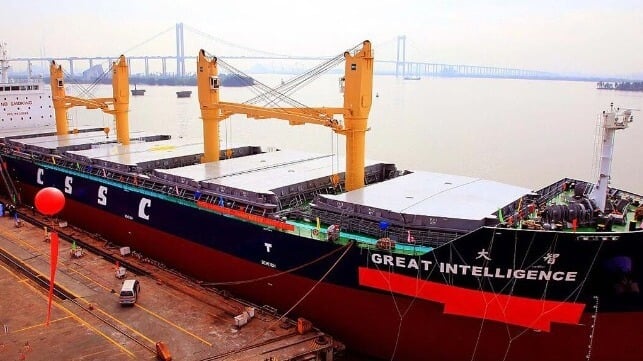White House Formally Blames China for "Unreasonable" Maritime Subsidies

China is by far the world's dominant shipbuilding nation, and the latest numbers from its industry ministry show that the lead has only widened. About 56 percent of all tonnage delivered worldwide came from China last year. Amidst a global boom, China now holds about 63 percent of the world orderbook, and its yards raked in an astonishing 74 percent of new orders over the course of the year. By certain measures, China also leads in ownership: about 19 percent of the global fleet is now Chinese-owned (and growing).
This has not gone unnoticed in Washington, and awareness of the strategic risk of a Chinese-controlled maritime transportation system has risen in Congress and in the White House. On Thursday, four days before President-elect Donald Trump's inauguration, the Biden administration formally announced that Chinese dominance in the maritime industry "is unreasonable and burdens or restricts U.S. commerce," leaving it subject to action under Section 301 of the Trade Act. The announcement was widely expected and provides leverage for Trump to negotiate with Beijing as soon as he enters the White House.
"Today, the U.S. ranks 19th in the world in commercial shipbuilding, and we build less than five ships each year, while the PRC is building more than 1,700 ships," said U.S. Trade Representative Ambassador Katherine Tai in a statement. "Beijing’s targeted dominance of these sectors undermines fair, market-oriented competition, increases economic security risks, and is the greatest barrier to revitalization of U.S. industries."
In a comprehensive report, the office of the USTR laid out how Beijing's intention to create a dominant maritime sector is "unreasonable." The office argues that the Chinese government has extraordinary control over investment decisions with Chinese bankers and lead players in Chinese shipping, like state-owned COSCO and CSSC, the world's largest shipowner and largest shipbuilder (respectively). USTR argues that this control is used to subsidize state shipping enterprises, estimated by independent studies as somewhere in the range of $11-16 billion per year in 2006-18.
The exact scale of China's government subsidies are hard to determine, USTR found, because of opaque relationships between firms in the Chinese state's giant business portfolio. "This opaqueness allows for China to hide the true extent of government support to the maritime, logistics, and shipbuilding sectors," USTR concluded.
According to USTR, China's subsidies are intended to create global market dominance in shipping, shipbuilding and logistics. As a result, U.S. trade is "carried out on vessels made in China, financed by state-owned Chinese institutions, owned by Chinese shipping companies, and reliant on a global maritime and logistics infrastructure increasingly dominated by China."
In addition to the Chinese maritime enterprises who are direct recipients of aid, the ultimate beneficiaries include Chinese manufacturers and exporters, who have enjoyed subsidized freight rates that give them an extra competitive edge. The Chinese government's runaway success in this endeavor "deprives market-oriented businesses and their workers of commercial opportunities, and lessens competition and creates dependencies on the PRC, increasing risk and reducing supply chain resilience," USTR concluded.
America's allies have also felt the impact. One study examined by USTR concluded that shipbuilding subsidies enacted in 2006 accounted for the entire price advantage that Chinese shipyards held over Japanese and South Korean yards in the years thereafter.
Five American unions had petitioned USTR to take action, and in a statement they issued their thanks.
"By targeting global maritime, shipbuilding and logistics sectors, the Chinese Communist Party has systematically – and publicly – worked to dominate this vital sector, leaving us increasingly dependent on the PRC and its industries to meet our economic and national security needs," said United Steel Workers President David McCall in a statement. "Now, we have the opportunity to turn the tide, create good, community-supporting jobs across the commercial shipbuilding supply chain and restore American maritime capacity and power."
